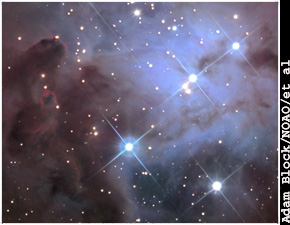|

Many people that get intrested in astronomy often forget that they are standing on the most easily observed of the planets
in the Solar System, Earth. The Earth is probably the most diverse and beautiful of all the planets. Earth is able to sustain
a wide variety of life, maintain a large variety of weather and envioronment, and is the only planet that we know of with
a large supply of water covering the majority of its surface.

The astronomynut is not one to discuss the origins of the universe, but regardless of the source of life on Earth it
is agreeable that man , the dominant species on Earth, has moved forward with leaps and bounds. In just a few thousand years
we have went from simple farmers and nomads to looking at the sky and not wondering if we will get to other worlds but when.
We have built our cities to massive heights, and have millions of people in just a few miles. We do have our problems
and may be our own destructors but we are just now in the infancy of our own technology, and perhaps we will learn to overcome
our own downfalls and work together to advance ourselves even further.

Any relation? >
|
 |
|
|
|
 |
|
Distance from Sun:
1.00 AU
Sidereal revolution period:
365.26 days
Mass (Earth = 1):
1.0
Radius at Equator (Earth = 1):
1.0
Sidereal rotation period:
23.9 hours
Moons:
1

The most prevelant feature of the Earth is the wide variety of plant and animal features. Everywhere you look you will
find life, from the deserts to the deepest reaches of the sea. I personally do not know if evolution is a fact or not, but
I do see that all life seems to work together not as a organism of the Earth but as a part of an world that we are a part
of it. The fact that we a given everything we need is amazing. But we also must respect our planet, and always be aware
of our changing world. We always have to be on the lookout freom volcanoes, earthquakes, and floods. But as long as there
is an Earth it seems that there will be life in our little section of the Universe.

< Any Relation?
|
 |
|
|
|

